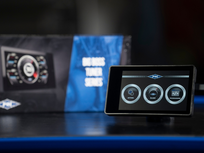Preventive maintenance is key to keeping diesel trucks operating at peak performance, and one essential component to prioritize is the diesel particulate filter (DPF). This part plays a crucial role in your truck’s efficiency, performance, and adherence to emissions standards.
Regular DPF cleaning is vital to preserving your truck’s power, maximizing fuel efficiency, and avoiding costly repairs down the line. Whether you’re managing a fleet or an individual vehicle, understanding the importance of DPF maintenance can extend your truck’s lifespan and keep it running smoothly mile after mile.
What Are Diesel Particulate Filters?
Diesel particulate filters are devices installed in diesel engines to trap and remove harmful particles, such as soot and ash, from the exhaust system. These filters are vital in reducing pollution, capturing up to 85% of particulate matter emissions, which can be harmful when released into the environment.
Over time, though, soot and ash build up in the filter. This can cause back pressure and oxidize the buildup, resulting in non-combustible material. This combination of non-combustible material and ash cannot be removed during operations. Eventually, it can impact the engine's performance and reduce fuel efficiency.
Why Do DPFs Need to Be Cleaned?
As mentioned earlier, the buildup in your vehicle’s DPF remains in the filter and cannot be removed. Eventually, it can clog your DPF and restrict exhaust flow, leading to several issues:
-
Reduced Engine Performance: When the DPF is clogged, the engine has to work harder to push exhaust through, resulting in decreased performance.
-
Lower Fuel Efficiency: Increased back pressure causes the engine to burn more fuel, impacting your truck’s fuel economy.
-
Risk of Component Damage: If the DPF becomes too clogged, it can lead to overheating and damage to the filter and other exhaust components.
-
Potential Fines: Vehicles failing to meet emissions standards can face penalties or be taken off the road until repairs are made.
Regular cleaning keeps the filter clear, allowing exhaust to flow more freely and reducing the risk of these issues.
How Often Should You Clean Your DPF?
The frequency of diesel particulate filter cleaning can vary between vehicles. Some factors include:
-
Driving Conditions: Trucks driven mostly on highways can go longer between cleanings, while vehicles driven in stop-and-go traffic may need more frequent cleaning.
-
Engine Hours: Higher engine hours naturally lead to more soot buildup, especially in heavy-duty or long-haul vehicles. Most diesel trucks need DPF cleaning every 200,000 to 300,000 miles, though it can vary depending on the manufacturer’s recommendations.
-
Maintenance Schedule: Sticking to a regular maintenance schedule can help identify when a DPF cleaning is necessary before problems arise.
It's also essential to keep a close eye on your truck's performance, as certain signs—like overheating or a noticeable drop in power — can signal potential issues with the DPF. Staying alert to these changes helps you address problems early, protecting your truck’s efficiency and longevity.
Types of DPF Cleaning
There are two primary methods used for diesel particulate filter cleaning: thermal and aqueous cleaning. Each method has its benefits, and the right choice depends on the filter type and its buildup level.
Thermal Cleaning
Thermal cleaning, also known as baking, uses heat to burn off the soot and ash trapped in the DPF. In this process, the filter is placed in a specialized oven, where high temperatures turn the accumulated soot into ash, which is then blown out of the filter with compressed air.
This method is effective for filters with heavy soot buildup. It is often used when regular cleaning cycles aren’t enough to clear the filter. It is recommended for high-mileage or heavily used trucks.
Aqueous Cleaning
Aqueous cleaning involves submerging the DPF in a cleaning solution that breaks down and removes soot and ash. The filter is then rinsed thoroughly with water to remove any remaining particles. This method is often used for filters that need a more thorough cleaning, especially those with stubborn deposits that thermal cleaning might not fully remove.
Which Type of Cleaning Is Best?
Both thermal and aqueous cleaning have advantages, and the right choice often depends on the filter’s condition. If you notice decreased engine performance or increased fuel consumption, thermal cleaning might be a quick solution. However, if the DPF is heavily clogged or hasn’t been cleaned in a long time, an aqueous cleaning could provide a more thorough cleanse.
Why Should You Let Professionals Clean Your DPF?
While DIY cleaning kits are an option, cleaning your DPF without experience is not recommended. Aside from avoiding damage due to mishandling, professionals are more suited because of the following:
- Specialized Equipment: Professional shops use advanced equipment that can reach higher temperatures and produce stronger airflows than home kits, ensuring a more effective clean.
- Detailed Inspection: During a professional cleaning, technicians also inspect the DPF for cracks, wear, or damage. Identifying these issues early can prevent costly repairs or replacements later.
- Proper Disposal of Waste: DPF cleaning produces soot and ash waste, which must be disposed of according to environmental regulations. Professionals handle waste disposal properly, so you don’t have to worry about compliance.
When To Replace Your DPF
While regular cleaning can significantly extend the life of a DPF, there comes a point when replacement is necessary. Knowing when to replace your DPF can save you from costly repairs and prevent unexpected breakdowns:
Let Big Shop Diesel Services Care for Your Truck
Maintaining a clean DPF is essential for optimal diesel engine performance, fuel efficiency, and meeting emissions standards. Big Shop Diesel Services offers expert DPF cleaning tailored to your vehicle’s needs. Our competitive prices and quality customer service give you the best value for your truck.
Don’t let a clogged DPF slow you down. Schedule an appointment with Big Shop Diesel Services today to keep your truck performing its best.



